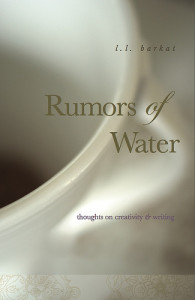I’m not the sort of writer who reads a lot of how-to writing books. It’s not that I don’t think they are good, or that I couldn’t use the instruction. It’s more that I’m afraid they’ll get in my head and then I won’t be able to write anymore. I won’t tell you that I haven’t read Annie Dillard’s The Writing Life or Stephen King’s On Writing because it might upset some of you.
But that’s not to say I don’t work at my writing. Rather, I learn best by studying the work itself. It’s like the way I have taught myself to code websites for my design business. If I see a particular design feature that I like, I study the code until I figure out how it’s done. So when it comes to writing, I learn by reading good writing. When I see something I like, I try to figure out how the author made it happen.
It works out well for me, then, that one of the few books on writing that I’ve read is L.L. Barkat’s Rumors of Water: It is both a writing book and deliciously good writing at the same time. (It may be true that it is the only writing book I ever recommend to anyone.) A few times in recent conversation I’ve been prompted to pull my copy from the shelf and share a timely quote, making me think it must be time to read the book again.
So this past Sunday afternoon, I did just that. Now that it’s done, I’ve collected ten terrific reasons to re-read Rumors of Water: Thoughts on Creativity and Writing. Perhaps you haven’t read Rumors yet for the first time. Let this be your introduction to the most delightful, inspiring book on creativity and writing you might find.
Top Ten Reasons to Read (or Re-Read) Rumors of Water
1. You’ll be reminded that writing is living
“In the hands of my younger daughter, Julia’s [Kasdorf] poem has taken on a new shape. Most of the original line breaks are gone. Now the poem breaks where the page ends and it takes up a lot more space. Plurals have become singular. There are crossouts and inverted add-this-here carats where words were forgotten then later added. Sane has become something like rain, spelled sain.
. . .
“I should spell sane like sain too—let the unrestrained rain of my own life infuse my writing. Let the me-I-am-right-now simply be.”
—Chapter 2 • How Will We Eat? • Let the Writing Be
2. We need to remember there isn’t a right way to write
“If we have been working on the same novel for ten years, or are still writing the history of the Aduki bean after researching it for a lifetime, that is okay. In the writer’s life, there are no rules about timing or quantity. Still, it might be worth asking ourselves if we have at our fingertips some small beans, just waiting for cultivation or chives.”
—Chapter 6 • Japanese Beans Write With What You Have
3. We learn that sometimes writing means sitting still and paying attention
“I am not going to tell anyone who her nemesis is. Some of us may be in need of a good censor (occasionally called an “Editor”). Some of us may be writing exactly what the market wants and ignoring what we want (to our personal creative detriment). We may be up at all hours, losing sleep, working too hard at our writing, because we haven’t learned to trust that it will still be there if we take a break and even procrastinate a little.”
. . .
“I can say that we should pay attention to our frustrations and our joys with writing; they might have something important to tell us. I can say that just when we figure out what our nemesis is and how to work it, the game will change.”
—Chapter 8 • Bishops & Gophers • Expect Challenges
4. It’s good for a writer to listen to the sound of his own voice
“Writers worry a lot about this, about voice. They are always wondering if they have one, and if not, how they can find one. The truth is that every writer has a voice. It is probably best heard by listening to oneself speak. However, once a writer starts setting down words, a process of elimination and substitution begins. A writer thinks there is a way to sound on the page, and reaches for it. Sometimes this works out okay; often, it makes for stilted language or turns the writer into an accidental copycat.”
—Chapter 9 • Do You Talk? • Listen to Your Own Voice
5. A writer might learn more studying a tangerine bloom than studying writing
“Sometimes aspiring writers ask me if they should get a degree in writing, or go to a lot of writer’s conferences. A writing degree and a conference will help us make valuable professional connections. They might inspire (or require) us to write. Which is a good thing. But we don’t need either of these experiences to find and use our voice. Our voice will be better developed if we spend time with our passions. Learn the difference between a tangerine and a tangelo. Consider the variation in their blooms, and the place where their nectar beads.”
—Chapter 11 • French & Spanish Tea • The Voice of Passions
6. We’ll be reminded that writing is often just doing the work
“When we possess a little natural talent for writing, we might be tempted to coast along. Why try to master these things called words? Isn’t writing an art? Doesn’t that mean we can just let things pour out as they will? I know a lot of writers who don’t work very hard, thinking this is no disaster.”
—Chapter 15 • Stealing Norton • Do You Work?
7. We can’t forget that a writer must protect his creative soul
“Watch out for siphons. Siphons can be people who don’t give us creative space. They can also be tools, technological or otherwise. Sometimes the very tools that once energized us will morph into siphons. Blogging has been that way for me at times. It is hard to release a tool when we are used to having it in our lives. It is hard to release a person, even though he or she may be hurting us creatively.”
“Releasing, by the way, doesn’t always mean leaving. It can just mean setting ourselves free from the need for another person’s constant approval or their unreasonable bids for our time. It could also mean finding new ways to creatively engage with a person, to turn our relationship into a source of joy and energy. The same is true for technology and other tools. Leaving might be in order, for sure, or maybe all that’s needed is a quarter turn, a new series of steps.”
—Chapter 17 • Big Bird in China • Do You Care for Your Writing?
8. A writer needs to trust the work
“Writers take different approaches to figuring out where to begin and where to end. A writer might find that the techniques that worked for one piece won’t work for another. It is important to trust the piece itself more than any single technique for creating it.”
. . .
“The other important thing to remember is that the work will ask of us what it needs. If everything seems like a big mess, at any point in the process, we can take that as a good sign. The work is trying to speak to us, trying to tell us what it needs. Our job is not to panic, but to listen and respond.”
—Chapter 19 • Football Cakes & Salvador • Beginning Structure
“A piece of writing knows what it wants and needs to be, but we get in the way. We want something serious to be funny, because we notice that funny writers are popular. We can write funny, we want to be popular, so we try to foist humor upon the work. It refuses. We want to be urbane; our writing wants to live in the country. We want a three-hundred page treatise; our words want to be a brief offering on the subject. We want to write sophisication; our work reminds us, ‘You are currently living of life of dirty frying pans and letter F’s that look like B’s.’ ”
—Chapter 2 • How Will We Eat? • Let the Writing Be
9. A writer must have a realistic vision
“It is not uncommon for writers to seek a large audience too early in their writing journeys. The idea of being published is a dream promoted by a cluttered market of writing books, writing conferences, and vanity publishers. . . I love working with new writers but often am surprised at the desire they have to pursue a publishing dream when they haven’t yet put on a small-time cooking show, so to speak.”
“I’ve heard it said that most successful writers put in about fifteen years of small-audience writing before they begin to work with larger audiences. There are exceptions, of course, but if every writer with a publishing dream thinks he is the exception, the math doesn’t work out. Ninety-nine percent of the writer population cannot be the exception to the Fifteen Years of Writing for Your Grandmother rule.”
—Chapter 22 • Fame in the Foyer • Can You Find a Small Audience?
10. We’ll be reminded that a writer needs community
“Yet as we continue moving we realize: someone is going to be too offended by what we write, or we may not be able to stay resilient under the pressure of schedules and the need to balance commitments, or the journey is long and uncertain. Sometimes we get where we are trying to go writing-wise and discover the world doesn’t care if we falter, as long as we keep serving up the kind of words they’ve come to expect from us. Sometimes we don’t get near where we thought we’d go, selling fewer articles or books than we ever envisioned, and we feel we’ve failed.”
“When these things happen, do we have someone to carry us? Have we developed a smaller community who really cares about us as people, about our creativity and our essential selves? A community that is not going to judge us too harshly, or be too jealous of our successes, or lack compassion when we don’t ‘succeed’? These are questions worth asking before we need their answers.”
—Chapter 26 • Cactus on the Way • Don’t Go Alone
Have you read Rumors of Water? Do you have a favorite passage or quote?
What other books on writing do you love?
Photo by Ed Schipul, Creative Commons license via Flickr. Post by LW Lindquist.
Browse our Rumors of Water book club
___________________________________
Buy Rumors of Water on Amazon now
Or, if you want to try before you buy, download an excerpt of Rumors of Water for free at Noisetrade now.
- Earth Song Poem Featured on The Slowdown!—Birds in Home Depot - February 7, 2023
- The Rapping in the Attic—Happy Holidays Fun Video! - December 21, 2022
- Video: Earth Song: A Nature Poems Experience—Enchanting! - December 6, 2022



Simply Darlene says
nectar beads slide into summer
on bee’s knees.
buzzzzz.
Donna says
Bzzzzzzz 😉
Donna Z Falcone says
Yup. Indeed. It is time for me to read Rumors again, too. Thank you LW! Oh that #4 keeps coming up for me, over and over again. Great list. Great post. 🙂
Megan Willome says
I recently reread it for structure and was astounded. The first time I read it, I wasn’t looking at the gears. There’s some lovely machinery at work. And it’s just great.
LLB says
I’ll have to find it first.
Richard Maxson says
I’m a first-time reader currently for Charity Craig’s and Ann Kroeker’s Writing Workshop, What an amazing book on the creative and writing process. It is unlike any book I have read on writing and I have read quite a few. It is a “living” testament to writing. It is NOT pedantic as many writing books are. It does not leave you with more questions about terms and techniques than it actually answers. It is a book about how a writer with a life elsewhere writes.. With chapter titles like “Bishops and Gophers,” “Ignoring Grandma,” “Monkeys and Field Grass,” and my favorite so far “Lighthouse in New Jersey,” (because I have always loved lighthouses), it is as intriguing as it is full of information about how to approach writing what you want to write about. When the workshop is finished I will read Rumors of Water again immediately. This is a writing book that demonstrates by example. Whether one writes poetry, fiction or non-fiction, writing includes your life. As for how to write, there are only rumors of writing. If you want to learn how to write, then live your life and write about it. It’s that simple and that difficult.
Donna says
You said it so perfectly. Yes! I really love this book. 🙂
Will Willingham says
Rick, I couldn’t agree with you more. 🙂 That’s what’s great about Ann and Charity’s book and workshop as well, that it addresses the approach to writing and to the writing life, rather than presenting itself as a how-to (and I do know those have their place for a lot of writers).
I’ve read Rumors a handful of times now (it’s a good one to pull out yearly) and find new reasons to delight in the writing process all over again.